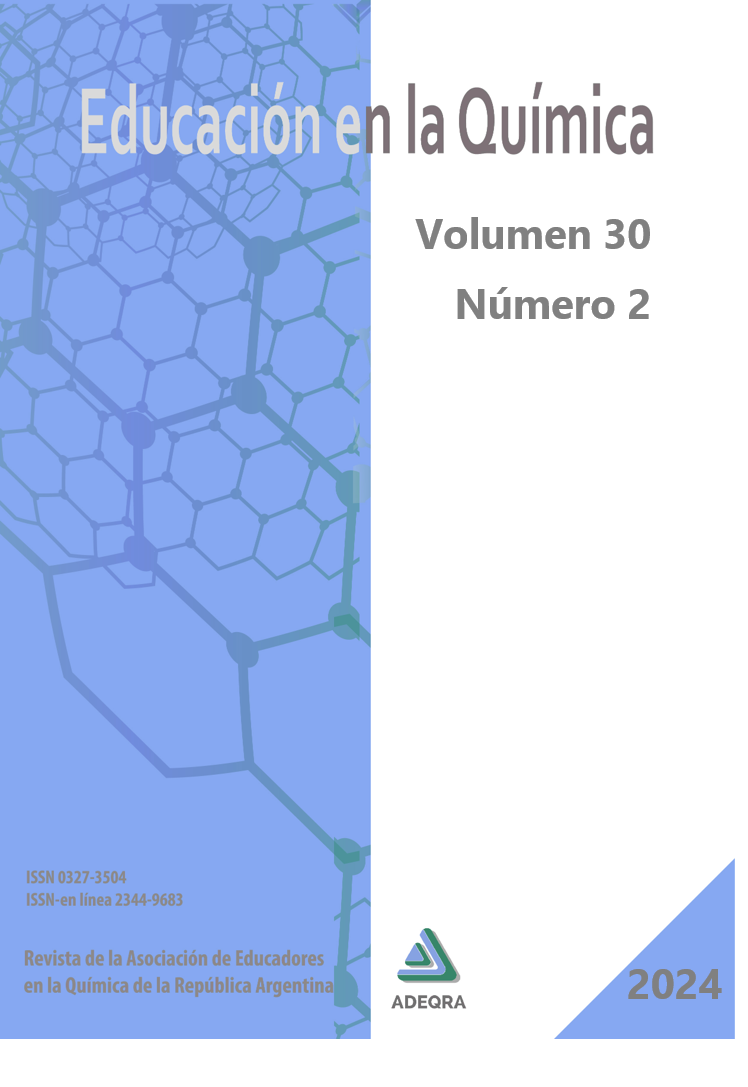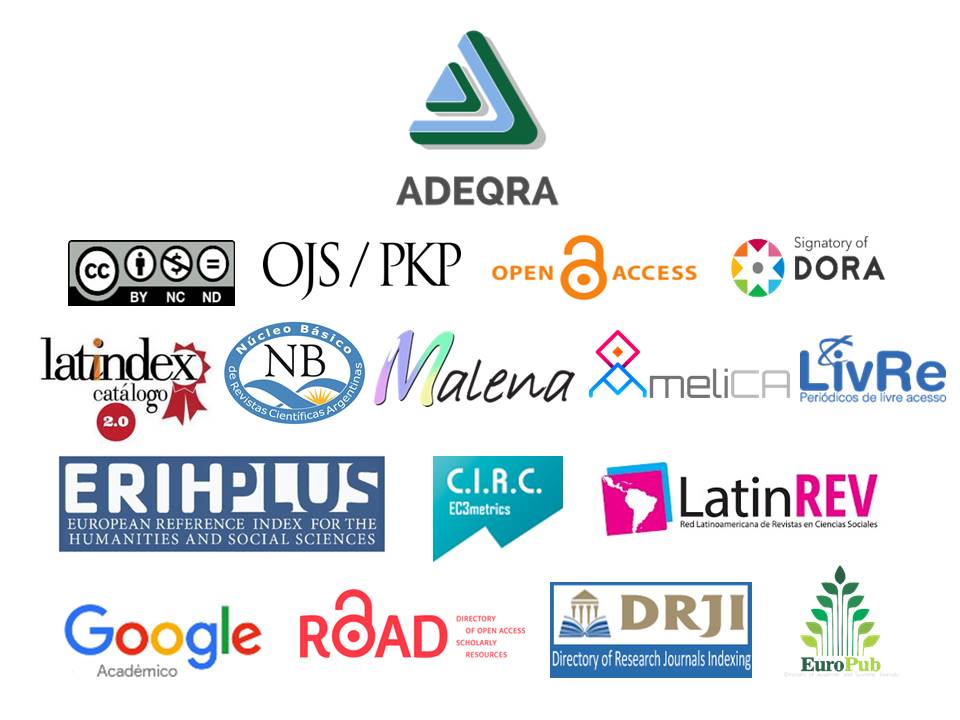Class diary writing: analysis from the interconnected model of teaching professional growth
Keywords:
initial teacher training, Interconnected Model of Teacher Professional Growth, class diariesAbstract
The Interconnected Model of Teacher Professional Growth (MICPD) describes the interrelated nature of teacher learning across various Domains. In this work, the MICPD is used to study the content of class diaries a future Chemistry teacher prepares regarding the relationships between Domains during her teaching practices. Using a qualitative methodology, a content analysis was used of each diary written after each intervention and their corresponding instances of socialization. The results showed a predominance of relationships involving the Practice and Consequences Domains in the intervention diaries and the External Domains in the socialization diaries. Little interpellation of the Personal Domain was found. The use of the MICPD allowed for a reading of the content of the diaries that were complementary to those proposed in other investigations. Deepening feedback is required to promote more links between domains.
References
Anijovich, R., Cappelletti, G., Sabelli, M. J. y Mora, S. (2021). Transitar la formación pedagógica: dispositivos y estrategias. Tilde editora.
Clarke, D. y Hollingsworth, H. (2002). Elaborating a model of teacher professional growth. Teaching and teacher education, 18(8), 947-967. https://doi.org/10.1016/S0742-051X(02)00053-7
Dewey, J. (1993). K Re-statement of the Relation of Reflective Thinking to the Education Process. Boston: DC. Health, y Co.
Dyment, J. E. y O'Connell, T. S. (2011). Assessing the quality of reflection in student journals: A review of the research. Teaching in Higher Education, 16(1), 81-97. https://doi.org/10.1080/13562517.2010.507308
Farrell, T. S. (2011). ‘Keeping Score': Reflective Practice Through Classroom Observations. RELC Journal, 42(3), 265-272. https://doi.org/10.1177/0033688211419396
Hatton, N. y Smith, D. (1995). Reflection in teacher education: Towards definition and implementation. Teaching and Teacher Education, 11(1), 33-49. https://revistas.uis.edu.co/index.php/revistadocencia/article/view/5954
Hernández Rojas, G., Cossío Gutiérrez, E. F. y Martínez Compeán, M. E. (2023). Aprender y reflexionar a través de la escritura de diarios académicos. Revista mexicana de investigación educativa, 28(97), 563-585.
Jarpa Azagra, M., Haas Prieto, V. y Collao Donoso, D. (2017). Escritura para la reflexión pedagógica: rol y función del Diario del Profesor en Formación en las Prácticas Iniciales. Estudios pedagógicos, 43(2), 163-178. http://dx.doi.org/10.4067/S0718-07052017000200009
Justi, R. y Van Driel, J. (2006). The use of the interconnected model of teacher professional growth for understanding the development of science teachers’ knowledge on models and modelling. Teaching and Teacher Education, 22(4), 437-450. https://doi.org/10.1016/j.tate.2005.11.011
Krippendorff, K. (2004). Content analysis: An introduction to its methodology. London: Sage.
Padilla, C. y Madueño, M. (2019). Reflexión sobre la práctica docente: ruta de formación del profesor universitario chileno. Revista Innova Educación, 1(4), 422-437. https://doi.org/10.35622/j.rie.2019.04.002
Pujol-Cols, T. H., Cutrera, G. y García, M. B. (2023). Modalidades de escritura y Modelo Interconectado de Formación Docente. Un estudio de casos durante el trabajo en pareja pedagógica. Divulgatio. Perfiles académicos de Posgrado, 8(22), 1–19. https://ojs.unq.edu.ar/index.php/divulgatio/article/view/401
van Woerkom, M. (2003). Critical reflection at work: bridging individual and organizational learning. University of Twente.
Voon, X. P., Wong, L. H. y Looi, C. K. (2018). Analysing the mediating processes of teacher’s growth: A case study in a seamless inquiry science learning environment. En: M. S. Jong, J. Shih, C. Loo, M. Huang, Y. Xie, Y. Zhang, D. Sun, R. Kuo, S. Tan, W. Lau, H. Xie, B. Jiang, M. Wang, S. Tu, M. Jiang, J. Geng, y Y. Zheng. (Eds.). Proceedings of the 22nd Global Chinese Conference on Computers in Education (GCCCE 2018) (pp. 773-780). Guangzhou: South China Normal University.
Wilkie, K. J. y Clarke, D. (2015). Pathways to professional growth: Investigating upper primary school teachers' perspectives on learning to teach algebra. Australian Journal of Teacher Education, 40(4), 87-118. https://doi.org/10.14221/ajte.2015v40n4.6
Wongsopawiro, D. S., Zwart, R. C. y van Driel, J. H. (2016). Identifying pathways of teachers’ PCK development. Teachers and Teaching, 23(2), 191-210. https://doi.org/10.1080/13540602.2016.1204286
Zhao, W., Huang, R., Cao, Y., Rui, N. y Zhang, X. (2022). A teacher's learning of transforming curriculum reform ideas into classroom practices in lesson study in china. International Journal for Lesson and Learning Studies, 11(2), 133-146. https://doi.org/10.1108/ijlls-07-2021-0056
Zwart, R. C., Wubbels, T., Bergen, T. C., y Bolhuis, S. (2007). Experienced teacher learning within the context of reciprocal peer coaching. Teachers and teaching, 13(2), 165-187. https://doi.org/10.1080/13540600601152520
Published
How to Cite
Issue
Section
License
Copyright (c) 2024 Tatiana Hilen Pujol-Cols

This work is licensed under a Creative Commons Attribution-NonCommercial-NoDerivatives 4.0 International License.



